1. Carmelo Anthony, Iman Shumpert and Toure’ Murry to Washington for Bradley Beal, Trevor Ariza, Jan Vesely, Eric Maynor, Al Harrington, Garrett Temple and a future pick.
Why not Washington as a potential landing spot for Anthony?
He grew up in Baltimore so it’s not outrageous to think he’d sign an extension near his hometown for an opportunity to build a contender next to John Wall.
Meanwhile, Washington has a legitimate trade asset that the Knicks would covet in Bradley Beal.

Melo and Wall are friends. Would Melo be willing to stay in D.C. long term?
While Beal proved to be too rich a price for the Wizards to relent in their recent pursuit of Greg Monroe, any opportunity to bring in Carmelo Anthony would have to make Beal expendable.
Beal is 20 years old and has the makings of an elite shooting guard in the future. Still, for Washington’s sake, is holding on to Beal for his potential worth giving up on the opportunity to pair Wall with a proven superstar in Anthony in as depleted an Eastern Conference as we will see for years to come?
Of course, the logical skepticism here is that the Wizards would need some sort of assurance from Anthony that he would re-sign with them going forward. After all, giving up Beal for a rental of Anthony and a chance at an Eastern Conference semi-finals or finals appearance seems extremely shortsighted. Unfortunately, Anthony wouldn’t be inclined to commit until he saw his team’s on-court success.
But here’s an interesting idea to consider: as mentioned above, there are virtually no teams on Anthony’s radar with the ability to sign him outright.* If Anthony were to decide to leave Washington following this trade, the Wizards could still presumably parlay his departure into a handful of assets in a worst case sign-and-trade scenario.
*The Bulls can free up close to enough cap space for Anthony if they chose to amnesty Carlos Boozer over the summer.
Losing Beal for a couple months of Anthony would obviously be hard to sell to the D.C. fans.
However, Beal for a decent chance of a long term Anthony-Wall pair or — if necessary — salvaging Anthony’s departure with a sign-and-trade over the summer isn’t a franchise killing move.
So lets say the Wizards would be willing to pull the trigger and take the risk that Anthony would re-sign with them this summer.
Anthony and Wall instantly make the Wizards the third best team in the East, at least. Some would argue they’re already there with Beal.
I personally would imagine the Wizards having a difficult time beating the Hawks or Nets in a playoff series as they’re currently constructed.
With Anthony and Wall pairing together, the Wizards would move closer to the Heat or Pacers’ tier in the Eastern Conference. Meanwhile, they would keep their 2013 first rounder, Otto Porter, and most future draft picks going forward. Total win.
For the Knicks’ sense, Beal is as promising a sure thing prospect without the “untouchable” label. He was the third overall pick in the 2012 draft and has quickly become one of the league’s best and most gifted shooting guards.
To make salaries work out, the Wizards would need to include cap fillers – headlined by Trevor Ariza. 
Because Ariza still has decent value (and because the Wizards wouldn’t be keen to the idea of trading Beal for Anthony’s potential short stay), the Knicks would likely have to include Iman Shumpert in the deal to give Washington a little extra incentive to say yes. If Washington insisted on returning even more, the Knicks could also include one of their backup-quality point guards (let’s say Beno Udrih) as well.
Afterward, the Wizards would field a starting lineup of Wall, Shumpert, Anthony, Nene, and Gortat (with the option to go small with Martell Webster or Otto Porter at small forward and Anthony at power forward.)
The Knicks would jumpstart their rebuilding project around Beal.
Felton, Beal, Ariza, Bargnani and Chandler is not a terrible starting lineup for the short term. Hardaway Jr., Stoudemire, Prigioni, Jeremy Tyler, Vesely and Kenyon Martin also provide decent depth.
I really like this one for both sides.
Now, if the Knicks did decide to trade Anthony, it wouldn’t make sense to just stop there.
Trading their All-Star would signify a waving of the white flag on this currently constructed Knicks roster.
The next best asset the team has to trade is Tyson Chandler.
Which contenders would be in the market for an elite defensive center with championship success? Several teams out West come to mind.
Again, here are three deals from most eccentric to most logical:
3. Tyson Chandler, Tim Hardaway Jr. and a future protected pick for Ricky Rubio and Nikola Pekovic
The Timberwolves are nearing panic mode with Kevin Love. Unless Minnesota shows clear signs of becoming a contender by this point next season, Love will be on his way out of town in the summer of 2015 — at the very latest.
While on paper the Rubio and Pekovic combination trumps Chandler and Hardaway Jr., it appears pretty obvious that Pekovic and Love are an inherently flawed interior tandem: both are slow defenders and both share redundancy on the offensive end.
Chandler, on the other hand, seems about as ideal a fit next to Love as anyone. Love looked up to Chandler as a child and they shared a front court for Team USA at the Olympics. Between Chandler’s ball batting prowess and Love’s offensive rebounding monopoly, the Timberwolves would form a strong identity as a team that can gain extra possessions on the boards. Chandler’s experience playing next to Dirk Nowitzki would also pay dividends offensively next to Kevin Love.
Hardaway, to his own right, has proven to be a capable starter going forward and is locked up on his rookie deal.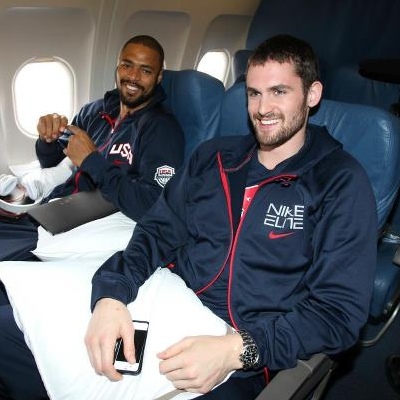
While it’s impossible to know whether Chandler could catapult the Wolves into the postseason, I think it’s worthy Flip Saunders’ time to consider. If need be, I think the Knicks would be willing to include Felton in exchange for J.J. Barea in the deal as well.
As for the Knicks, this deal has some obvious benefits. Returning star power in Rubio would give the Knicks fans something to be excited about.
NBA fans have already turned on the 23-year-old Rubio. As informed followers know, the former teenage prodigy is on track to become the worst shooter in NBA history. He’s an offensive floor clogger at the end of games as opponents crowd the paint and dare him to take perimeter shots.
Still, his passing is elite by any standard and his defense — when motivated — is surprisingly dynamic. At only 23, it’s not unreasonable to think his shooting can get turned around.
He’s set to become a restricted free agent after next season and few people have any real idea of what he’ll command in his next contract. He’s got obvious starter quality skill — in spite of his shooting woes — but it’s hard to say with confidence that he’ll be worth more than Jeff Teague (who got four-years, $32 million last summer.)
In this hypothetical deal, the Knicks would have a year to audition him before having to decide on his future at next season’s trade deadline.
Pekovic, meanwhile, is a highly reliable and efficient center with one of the most rounded offensive games for any big in the league. His contract goes on for four more years at around $50 million so it’s not unrealistic to think the Knicks would eventually look to trade him. Still, for a team on the rebuild, Pekovic is definitely a valuable asset to have.
In order to help facilitate this trade – and simultaneously make it more feasible – it would make sense for Toronto to get involved. They shopped Kyle Lowry to the Knicks earlier in the season and had reported interest in Hardaway Jr.
If Minnesota could upgrade from Rubio to Lowry and from Pekovic to Chandler (upgrade next to Love at least) — without having to give up more than a few future second round picks next to Hardaway Jr. — it would make a whole lot of sense.
Still, I think there are more realistic trades for Chandler to be had.
2. Tyson Chandler and Raymond Felton for Reggie Jackson, Thabo Sefolosha, Kendrick Perkins and a future protected pick.
Once Russell Westbrook gets clearance from doctors to return to the court, this deal would become pretty hard for Oklahoma City to resist. Chandler and Serge Ibaka would combine to form the most lethal interior defense in the league and would compliment a Durant-Westbrook pair phenomenally. 
Though Raymond Felton’s days as a starter may be behind him, he’s more than capable of fulfilling backup point guard obligations.
Jackson is due for a big contract after next season so his future in Oklahoma is already in question.
As for the Knicks, the opportunity to add a blossoming star like Jackson while adding a future pick to the mix would be a total win for the future. For that opportunity, beyond parting with Chandler, New York would also have to be willing to take back Kendrick Perkins’ contract for next season.
The biggest holdup in this trade from the Knicks side would be Reggie Jackson’s expectations as a free agent. He’s restricted in 2015 and he’s probably going to fetch around $10 million annually. That projection is fair based on his stats from this season. Even so, that eight-figure deal would eat at the Knicks’ plans for a big summer in 2015.
There’s one more trade that the Knicks should explore.
1. Tyson Chandler, Kenyon Martin and Metta World Peace for C.J. McCollum, Thomas Robinson, Meyers Leonard, Joel Freeland, Victor Claver and a future first round pick.
Blazers coach Terry Stotts, an assistant for Rick Carlisle with the 2011 Mavericks, knows exactly how helpful Chandler could be for Portland’s championship aspirations.
Put Chandler, Aldridge, Batum, Matthews and Lillard on the court together and that might be the best team in the NBA.
Is it possible? .jpg)
The Knicks would certainly require 2013 first round pick C.J. McCollum and 2012 first round pick Thomas Robinson as bare minimums. I’d assume Joel Freeland and/or Meyers Leonard, two centers, would have to be included as well. This still might not be enough to convince the Knicks to trade Chandler.
If the offer came Portland’s way, I don’t think they’d hesitate to include a future first-round pick. Portland’s pick this year is already going to Charlotte (Gerald Wallace trade), so New York would have to wait until 2016 for that pick at the very earliest.
The Blazers would get two players to add to their rotation and, at this win-now state in Portland, Martin (if healthy) might actually be equally productive to Robinson for the remainder of the season.
As for the Knicks, McCollum is locked up for a long while on his rookie deal and has shown flashes of serious promise. Though he’s been hampered by injuries this season, his rival rookie point guards – Michael Carter Williams and Trey Burke — have excelled. McCollum held his own with those two in summer pre-draft workouts so there’s reason to be optimistic about him.
Thomas Robinson was the fifth overall pick in 2012 and would be getting traded for the third time in two seasons. He’s having a fairly productive season with Portland. New York would have the playing time available to help him grow. Leonard, another lottery pick from 2012, doesn’t look like he’ll ever be a starting quality center but he has the makings of a rotation player for a long time. He too would have an opportunity to grow in New York.
Adding these three pieces and a future pick would give the Knicks a serious boost in their rebuilding efforts.
Meanwhile, acquiring Chandler without having to give up Robin Lopez would move Portland up one tier in the Western Conference rankings.
It just works really well for both sides.
So while the Knicks remain firm in their stance on keeping Anthony at the risk of losing him over the summer, it looks pretty obvious that they should reconsider.
At 20-31 and without much young talent to feel optimistic about, New York would be wise to build ahead toward a more promising future.
Disagree with a trade? Have an idea of your own? Let us hear your thoughts in the comments section.
Jacob Eisenberg is a junior at Emory University. He’s currently spending the spring semester abroad in Rio de Janeiro, Brazil. Check out his website here and be sure to follow him on twitter @eisenberg43.
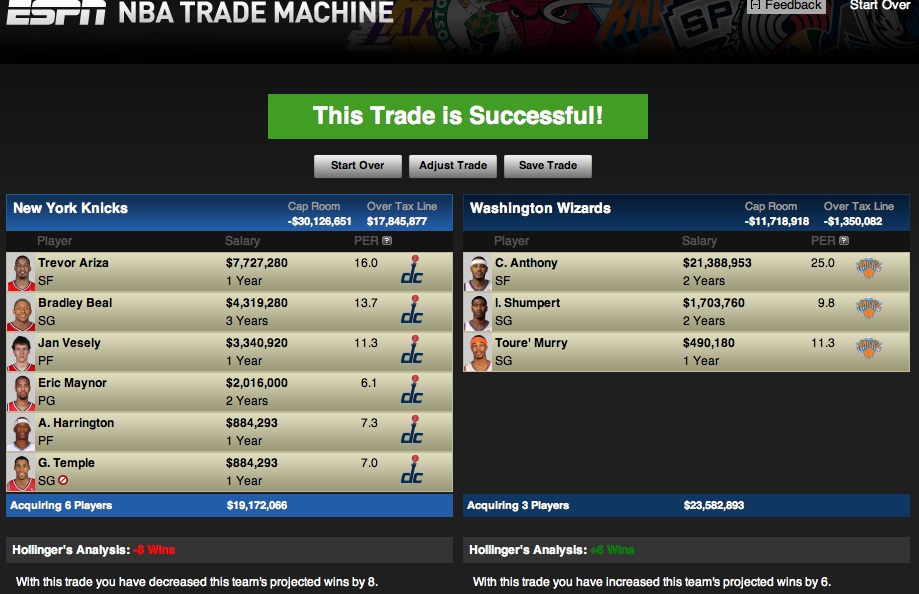
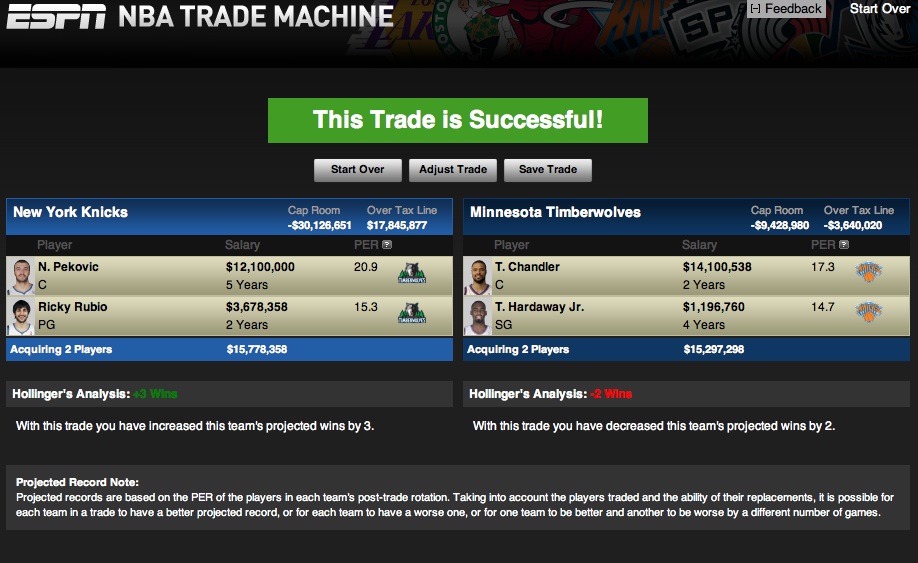
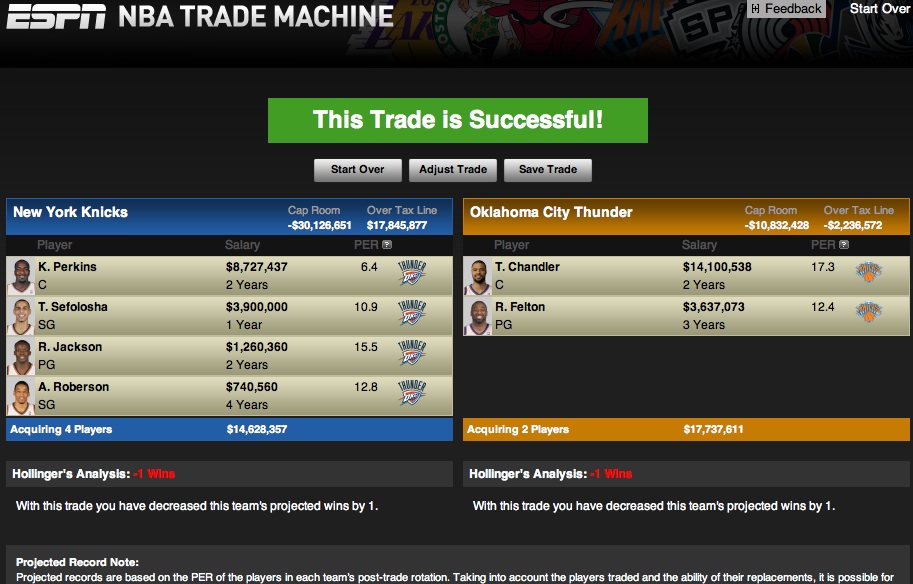
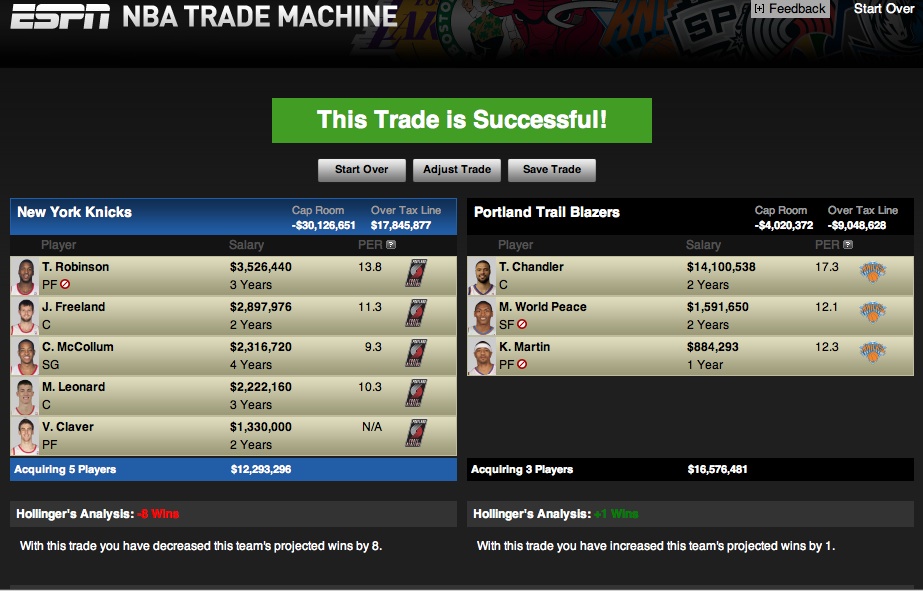
Carmelo Anthony is not 28 as the article states. He’s 29 and will be 30 by the end of the season.
Some of these trades make sense. I like the Washington trade especially since Washington seems to believe Wall is a great player (I’m not sure of that…), worthy of accommodating at any cost. The Bulls trade also makes sense. If Mirotic was in an average draft, he’d probably be a top five pick, so he’s far and away Chicago’s best asset.
I think though the flaws in some of these trades are that the Knicks, if they give up or lose Anthony, have only one path that makes any sort of sense: make everyone available and tank 14/15 while working hard to maximize cap space in summer 2015 by trying to get out of Felton and JR’s contracts and not taking on any bigger contracts that go beyond 14/15. That means that the only assets they should want are players who are on rookie deals that last at least through 15/16 (so 2012 draft or later) and future draft picks. Mirotic works too since you could probably leave him over in Europe one more season. They would want to avoid players like Taj Gibson and David Lee, whose contracts extend beyond 14/15.
There’s absolutely no way that Portland gives up that much for Chandler and if they did, New York would be stupid not to jump all over it.
I still don’t understand why writers insist the Knicks need to trade Anthony, or seem so certain that he will leave. Has anyone considered the Knicks building around Anthony beyond this season, instead of blowing the whole thing to bits and rebuilding?
Or is that just too boring of an article to run?
Agree 1000%. It’s easier to build around a superstar talent …than having young talent looking for the right star player to fit in. If he decides to leave, then let the money come off the books.
Let the money come off the books and still be significantly over the cap with money commited elsewhere to Chandler, Bargs, Amare, and JR?
Its not like Anthony leaving will give them cap space to sign a free agent. By the time Bargs, STAT, and JR come off the books, the Knicks will have to commit money longterm to Shump and Hardaway.
I dont see how adding a Beal or a Barnes is a quick fix.
All of those players you just named… STAT Chandler Bargs and more… will be in the last year of their contracts and worth gold for trades and draft picks next season. If Melo leaves and his salary, the Knicks will be primed to make a run like the Heat did years ago. Do your research.
None of these deals are worth while. Melo is still a superstar talent. And Chandler (when healthy) is still a beast. The Knicks need a bonafide PG and a SF with some type of game. Every trade here adds more redundant talent. NY needs to stay the course and retool when these contracts expire. The quick fixes stopped working in the 90’s.
And how do teams deal with 4 or 5 players in and only 2 out into their February rosters? What ever happened to “A better basketball site. For intelligent readers, from veteran writers. Keep scrolling down. Good stuff here.” No, message board chazerai here.
Maxey, thanks for reading and for your worthwhile question.
In each of these deals, the Knicks would be sending out more money than they’d be taking in (exception being the two-for-two with Minnesota). As is the case, the Knicks could release any of their lower end players on guaranteed deals and still be saving money. Tour’e Murry, Cole Aldrich, Beno Udrih or any flotsam acquired in a trade to make salaries work would come to mind.
The Wizards released three guaranteed contracts they acquired from Phoenix immediately following the Gortat-Okafor trade.
While releasing guaranteed contracts isn’t common, it’s not unheard of either. Rumblings out of Miami suggest the Heat are prepared to release either Roger Mason or Toney Douglas within the next week.